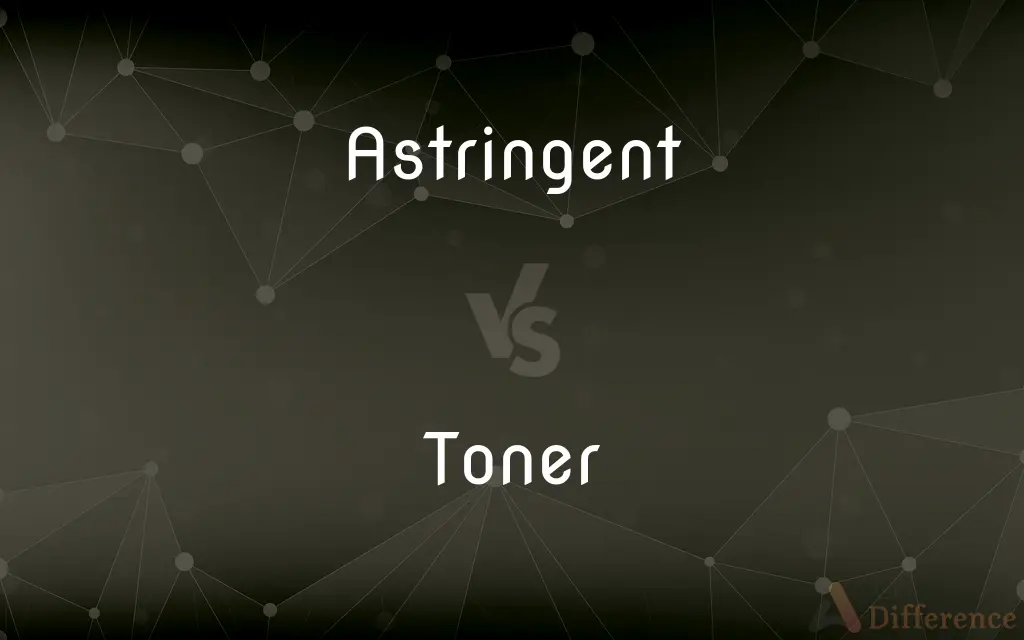Astringent vs. Toner — What's the Difference?
By Tayyaba Rehman — Updated on September 22, 2023
Astringents tighten the skin and often contain alcohol; toners balance skin's pH post-cleansing. Both aid in skincare routines, but serve different functions.

Difference Between Astringent and Toner
Table of Contents
ADVERTISEMENT
Key Differences
Astringent and toner are both popular skincare products used primarily after cleansing the face. An astringent is formulated to constrict or tighten the body's tissues and is commonly used to minimize the appearance of pores. Due to its strong tightening effect, an astringent can sometimes be drying, especially for those with sensitive skin.
On the other hand, a toner's primary role is to balance the skin's pH level, which might be disturbed after using a cleanser. Toners can help remove any remaining makeup or cleanser and prepare the skin to absorb the next products in a skincare routine, such as serums or moisturizers. Some toners also hydrate, provide additional cleansing, or deliver targeted treatment like exfoliation.
While both astringents and toners aim to refine the skin, their formulations can differ. Astringents usually contain alcohol, which can have a drying effect, making them suitable for oily skin types. Toners, conversely, might contain hydrating and soothing ingredients, catering to a broader range of skin types.
Furthermore, the choice between astringent and toner often depends on individual skin concerns and needs. While someone with enlarged pores and oily skin might lean towards an astringent, another person with dry or combination skin might find a hydrating toner more beneficial.
Comparison Chart
Primary Purpose
Tightens the skin and minimizes pores
Balances skin's pH after cleansing
ADVERTISEMENT
Common Ingredients
Alcohol
Water, plant extracts, hyaluronic acid
Suitable For
Oily skin types
All skin types, specific formulations for different needs
Aftereffect
Can be drying
Often hydrating or neutral
Usage in Skincare Routine
After cleansing, before moisturizing
After cleansing, before serums and moisturizers
Compare with Definitions
Astringent
Constricts body tissues upon application.
The cooling sensation of the astringent was immediate upon application.
Toner
Can remove residual makeup or cleanser.
The toner effectively removed the leftover mascara on her eyelashes.
Astringent
Often used after cleansing but before moisturizing.
She followed her face wash with an astringent to tighten her pores.
Toner
A product used to balance skin's pH after cleansing.
After washing her face, she applied a toner to restore balance.
Astringent
A skincare product that tightens skin and minimizes pores.
She applied the astringent to control her oily skin.
Toner
Suitable for various skin types, with different formulations available.
She chose a rosewater-based toner to suit her sensitive skin.
Astringent
Often contains alcohol and can be drying.
Because the astringent had a high alcohol content, it wasn't suitable for her dry skin.
Toner
Generally used after an astringent or cleanser and before serums.
Following the astringent, she used a toner to hydrate her skin.
Astringent
Suitable for people with oily skin or large pores.
The astringent helped him manage his acne-prone skin.
Toner
Toner is a powder mixture used in laser printers and photocopiers to form the printed text and images on the paper, in general through a toner cartridge. Mostly granulated plastic, early mixtures only added carbon powder and iron oxide, however, mixtures have since been developed containing polypropylene, fumed silica, and various minerals for triboelectrification.
Astringent
An astringent (sometimes called adstringent) is a chemical that shrinks or constricts body tissues. The word derives from the Latin adstringere, which means "to bind fast".
Toner
A chemical bath used to change the color of a photographic print or to preserve black-and-white prints or movie film.
Astringent
(Medicine) Tending to draw together or constrict tissues; styptic.
Toner
A powdery ink used dry or suspended in a liquid to produce a document by means of a photocopier or laser printer.
Astringent
Sharp and penetrating; pungent or severe
Astringent remarks.
Toner
A lotion used to refresh the skin.
Astringent
A substance or preparation, such as alum, that draws together or constricts body tissues and is effective in stopping the flow of blood or other secretions.
Toner
Powder used in laser printers and photocopiers to form the text and images on the printed paper.
Astringent
A substance which draws tissue together, thus restricting the flow of blood.
Toner
Cosmetic lotion designed to cleanse the skin and shrink pores, usually used on the face.
Astringent
Extremely sour, bitter.
Toner
A musician, particularly one that plays a wind instrument.
Astringent
Sharp, caustic, severe.
Toner
A hair product used to reduce brassiness and increase shine in bleached and dyed hair.
Astringent
Causing a dry or puckering mouthfeel; characteristic of foods with high tannin content, such as certain kinds of berries and citrus fruits.
Toner
A solution containing chemicals that can change the color of a photographic print
Astringent
(medicine) Having the effect of drawing tissue together; styptic.
Toner
A substance used in a printer to develop a xerographic image
Astringent
Drawing together the tissues; binding; contracting; - opposed to laxative; as, astringent medicines; a butter and astringent taste; astringent fruit.
Toner
A lotion for cleansing the skin and contracting the pores
Astringent
Stern; austere; as, an astringent type of virtue.
Toner
Often hydrating and prepares skin for subsequent products.
Her skin felt refreshed and ready for serum after using the toner.
Astringent
A medicine or other substance that produces contraction in the soft organic textures, and checks discharges of blood, mucus, etc.
External astringents are called styptics.
Astringent
A drug that causes contraction of body tissues and canals
Astringent
Sour or bitter in taste
Astringent
Tending to draw together or constrict soft organic tissue;
Astringent cosmetic lotions
Common Curiosities
Why might someone choose a toner over an astringent?
Toners can be more hydrating and less drying than astringents, suitable for various skin types.
Is it essential to use a toner in a skincare routine?
While beneficial, it's not mandatory. It depends on individual skin needs.
What's the primary purpose of an astringent?
An astringent tightens the skin and minimizes the appearance of pores.
Are all astringents alcohol-based?
While many astringents contain alcohol, not all do. Always check the ingredient list.
Are there toners for sensitive skin?
Absolutely, there are toners formulated specifically for sensitive skin.
Can I use a toner to remove makeup?
Yes, toners can help remove residual makeup after cleansing.
Can I use both astringent and toner in my skincare routine?
Yes, but always use the astringent first, followed by the toner.
Can an astringent help with acne?
Yes, by controlling oil and minimizing pores, it can assist in acne management.
How often should I use a toner?
Toners can typically be used daily, either morning or night, post-cleansing.
Do toners expire?
Yes, like all skincare products, toners have an expiration date. Always check the packaging.
Can I use an astringent daily?
Depending on skin type, daily use might be too drying. It's essential to monitor skin's reaction.
Is an astringent the same as a face wash?
No, an astringent is used post-cleansing to tighten skin, whereas a face wash cleans the skin.
Can I apply moisturizer after using an astringent?
Yes, it's often recommended to moisturize after using an astringent to prevent dryness.
Can toners help reduce acne scars or dark spots?
Some toners formulated with specific ingredients can help fade scars or dark spots over time.
Should I store my astringent or toner in the fridge?
While not necessary, some people prefer the cooling effect when stored in the fridge. Always check product recommendations.
Share Your Discovery

Previous Comparison
Geographist vs. Geographer
Next Comparison
Economy vs. EconomicsAuthor Spotlight
Written by
Tayyaba RehmanTayyaba Rehman is a distinguished writer, currently serving as a primary contributor to askdifference.com. As a researcher in semantics and etymology, Tayyaba's passion for the complexity of languages and their distinctions has found a perfect home on the platform. Tayyaba delves into the intricacies of language, distinguishing between commonly confused words and phrases, thereby providing clarity for readers worldwide.















































